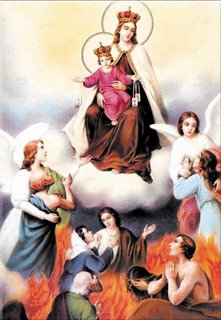What is Purgatory?

I'm preparing a presentation for our campus Newman Society on Purgatory and indulgences, and I thought I would share it in a series of posts. (It will also be a lot more condensed than the sacred vessels series, because I already have the material collected and mostly written.) This, part 1, covers the basic question of what Purgatory is and who goes there.
The word Purgatory itself comes from the Latin purgare, "to make clean, to purify." Fittingly, Purgatory is a place or condition of temporal punishment for those who, departing this life in God's grace, are, not entirely free from venial faults, or have not fully paid the satisfaction due to their transgressions. All persons then, save the saints (who through their lives of heroic virtue have atoned fully for their sins), the Blessed Virgin, and Christ Himself (neither of whom had any sins to be purified of) pass through Purgatory.
That's a bit of a loaded definition, inasmuch as it relies upon words relatively common in doctrinal parlance but perhaps unknown to the more casual observor. So, we'll provide some definitions before moving on.
Temporal Punishment is the punishment for sins, both mortal and venial, that necessarily and naturally follows from the negative effects of sin on the soul (which themselves are termed "temporal effects" of sin). Temporal punishments are those things we suffer because of sins and to make up for them, penances done either on earth or in purgatory to provide satisfaction for our sins. It should not be confused with the “eternal punishment” of the damned. The eteneral punishment of hell is a result of the particular act of the soul to separate itself from God willingly by refusing His forgiveness through failure to repent of serious wrongdoing. Temporal punishments, however, exist because of the nature of sin and because of God’s justice. Sin separates us from God, and we must undergo some process that erases that effect and brings us back closer to God in order to enter into the full union with Him that is Heaven.
Satisfaction is merely that which is done to make up for sin and to satisfy the fulfill consequences thereof.
Purgatory allows those who made inadequate penance on earth, or who committed venial sins for which they did not repent, to be cleansed of the guilt of those sins before entering into Heaven and God’s presence. Thus, we are "purged" or "cleansed" of sin and its guilt in Purgatory. In so doing we fulfill on the most ultimate scale the act of purification that has always been required of those coming into the presence of God: the Levitical high priest entering the Holy of Holies or the ordained priest offering the Mass in persona Christi are bound by rituals of purification that make them fit to enter into the limited, earthly contact with the divine that their offices require. So too must we, when called once and for all to assist Christ at the perpetual Mass before the face of God, be purified completely. (More on why we need Purgatory coming in part 3, "why does Purgatory exist.")
File Under: Doctrine








1 Comments:
hi, on this whole post, you have not any bible verses, so in saying this you also call christ only completed, what, 70% on the cross, and even after this the poor sinner is still left with halftruths, sorry, get a bible, anyone who comes to christ ,never will he cast out, what more do you want, its not Purgatory you should worry about, its hell, sorry but calling the christ a false savour, and getting people to pray for the dead, yes is never in any teaching , at least true teaching, we are all sinners, but by grace, we go to christ, he takes all our sins, to the cross,and if you believe this not so, then you anr or ever a christian, the holy spirit, will come and free you, from this false, doctrines, please come to christ, my heart breaks on this un -ible teaching,
Post a Comment
<< Home